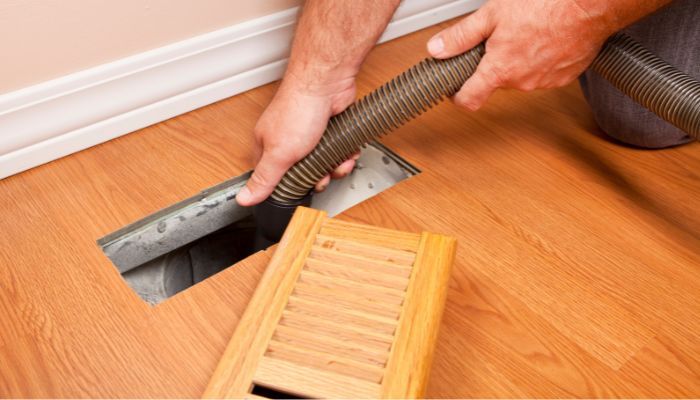The Benefits Of Regular Air Vent Maintenance: Improve Your Indoor Air Quality
TLDR: Regular air vent maintenance is vital for optimal HVAC system performance and indoor air quality in homes and businesses. Benefits include improved air quality, energy efficiency, and prevention of allergies and respiratory issues. Cleaning frequency depends on factors like building type and occupancy, with residential vents typically cleaned every 3 to 5 years. Professional services like Cleaner Choice offer personalized recommendations and thorough maintenance to ensure clean and healthy indoor air.
In today’s fast-paced world, we focus on healthy food, physical activity, and hydration, but how many of you truly pay attention to the air inside your home or business? Pollution is present outdoors, and preventing it indoors depends solely on how effective your HVAC system is. Given how important HVAC systems are for the air we breathe, neglecting them can result in a host of issues affecting both your health and your property.
Air vents require regular maintenance to operate at the top of their capacity. By cleaning and taking care of your air vents, you can drastically improve the efficiency of your HVAC system, reduce energy consumption, and minimize the risk of associated respiratory diseases. Today, we will focus on discovering the benefits of regular air vent maintenance and the best practices to ensure your air vents are spotless.
Air Vents and Ductwork
Before diving into the benefits of air vent maintenance, you need to know how they work to understand how the issues that appear in air ducts affect their performance. The key components of your system are air vents and air ducts.
Air vents, usually referred to as registers or grilles by industry professionals, are the visible components of your system, typically placed on walls or ceilings. They allow conditioned air to enter your living or working space.
Air ducts are the hidden parts of the system tasked with distributing heated or cooled air throughout your property. Made from a variety of materials, such as sheet metal, fiberglass, or flexible plastic, these pathways connect the central HVAC system to all rooms and areas.
The Benefits Of Regular Air Vent Maintenance
Over time, air vents and all associated ducts tend to accumulate particles like dust and dirt. This buildup can mechanically restrict airflow, resulting in diminished HVAC system efficacy and lowered indoor air quality. All these issues are easy to deal with just by scheduling regular maintenance and cleaning of your HVAC system.
There is a wide range of benefits to keeping your air vents and ducts in pristine condition, ranging from improved air quality to an extended HVAC system lifespan. Let’s delve deeper into each of these benefits:
Better Air Quality
As air circulates through the air ducts, it can pick up various accumulated contaminants (pollen, pet dander, mold spores, dust, and bacteria) and carry them toward living or working areas. Regular maintenance helps keep air vents and ducts clear of such particles.
Improved Energy Efficiency
The less strain your HVAC system has to deal with when pushing air through the air vents, the more efficiently it will operate. Clean air vents and ductwork allow air to flow without restrictions so the HVAC system can easily maintain the desired temperature.
Prevention of Allergies and Respiratory Issues
Airborne particles and contaminants from air ducts can trigger all kinds of allergies and other respiratory issues, particularly affecting those with pre-existing conditions. Clean air vents neutralize the presence of irritants in the air.
Cost Savings on Energy Bills
You are already trying to cut back on your energy bill (we all are), so remember not to neglect your air vents, as that can directly contribute to increased energy bills. A congested HVAC system requires more energy to heat or cool your home. While maintenance does cost, the math works in your favor in the long run.
Mold and Mildew Prevention
As moisture builds up in your air vents and ductwork, it creates the right conditions for mold and mildew growth. Mold spores then circulate to all parts of your home or workplace, negatively affecting respiratory health.
Extended HVAC System Lifespan
HVAC systems are a significant investment, and regular maintenance is essential to protecting them. The better you take care of your system, the longer you’ll get out of it, skipping costly repairs or premature complete replacements.
Removal of Foul Odors
Accumulated debris in the air vents, especially when combined with moisture, emits foul odors, permeating the property. They are particularly noticeable when the HVAC system is working.
Avoiding Fire Hazards
Particles that gather in the air ducts, especially dry debris like dust, pose a serious fire hazard. This buildup can fuel a fire and help spread it quickly through each part of the ductwork.
How Often Should You Have Your Air Vents Cleaned?
Now that we understand the benefits of regular air vent cleaning, it’s important to determine how often you should have professionals perform it. The frequency depends on several key factors, such as the type of building, the number of occupants, and the environment.
The most important thing, however, is whether you’re looking to set up a maintenance schedule for your home or a commercial space:
Residential Air Vent Cleaning Frequency
It’s generally recommended to have air vents cleaned in 3 to 5-year intervals. Such a wide range depends on specific factors you need to consider:
- Potential for allergies: If you or your family members suffer from allergies, asthma, or any similar respiratory issue, you will benefit from more frequent air vent cleaning.
- Presence of pets: The more pets in your household, the more shredded dander or fur gets in your air vents demanding more frequent attention.
- Renovations: If you have recently completed renovations or construction work in your home or workplace, cleaning the air vents should be the final step. Removing any accumulated construction-related debris is essential.
- Smoking: When smokers are present inside the premises, the frequency of air vent cleaning increases. The more smokers, the more often you will need to schedule your HVAC maintenance.
- Environmental factors: High levels of outdoor pollution also directly affect the performance of your HVAC system, requiring attention and cleaning more often.
Taking Care of Commercial Air Vents
In commercial properties, regular maintenance of air vents and ducts depends greatly on the type of business, the size of the building, and the number of visitors per day. There are also industry regulations and guidelines to consider.
Some of the factors that decide the optimal cleaning frequency for commercial properties include:
- Building type: Different commercial buildings have different requirements in terms of air vent cleaning and maintenance. Healthcare facilities, restaurants, and educational institutions, for example, usually require a lot more frequent attention than properties with less foot traffic.
- Industry regulations: Certain industries have established guidelines and regulations regarding the frequency of air vent cleaning to ensure optimal air quality. Compliance with these regulations is not only legally mandatory but also ensures a safe and healthy environment for all.
- Occupancy: Buildings with high occupancy rates or highly frequented indoor areas require more frequent air vent cleaning to provide and maintain satisfactory indoor air quality levels.
All in all, these are general guidelines, and individual circumstances may vary. Consulting with a professional air vent cleaning service can provide personalized recommendations based on your specific needs.
Regular Air Vent Maintenance: Final Thoughts
The quality of the air in your household or place of work is essential for your health, your comfort, and your savings. These three crucial aspects alone require a serious approach to regular cleaning, particularly now that you are aware of the benefits of regular air vent maintenance.
While you can perform some minor maintenance tasks, you will need a professional service like Cleaner Choice to reach the depth of the air ducts. If you haven’t given your HVAC system any attention lately, contact us to take care of all air vent-related services for you!
FAQ
How often should I clean my air vents?
It’s recommended to have your air vents cleaned every 3 to 5 years for residential properties. However, factors like allergies, pet presence, renovations, and environmental pollution levels may necessitate more frequent cleaning.
What are the benefits of regular air vent cleaning?
Regular air vent cleaning improves indoor air quality, enhances energy efficiency by allowing better airflow, prevents allergies and respiratory issues, extends the lifespan of HVAC systems, and eliminates foul odors and fire hazards.
How do I know if my air vents need cleaning?
Signs that your air vents need cleaning include noticeable dust buildup around vents, musty or unpleasant odors coming from the vents, decreased airflow from vents, and increased allergy symptoms or respiratory issues among occupants.
Why should I hire a professional like Cleaner Choice for air vent cleaning?
Professional services like Cleaner Choice have the expertise, tools, and equipment to perform thorough air vent cleaning, reaching deep into the ductwork to remove accumulated dust, debris, and contaminants. They can also provide personalized recommendations based on your specific needs and circumstances, ensuring clean and healthy indoor air quality.

